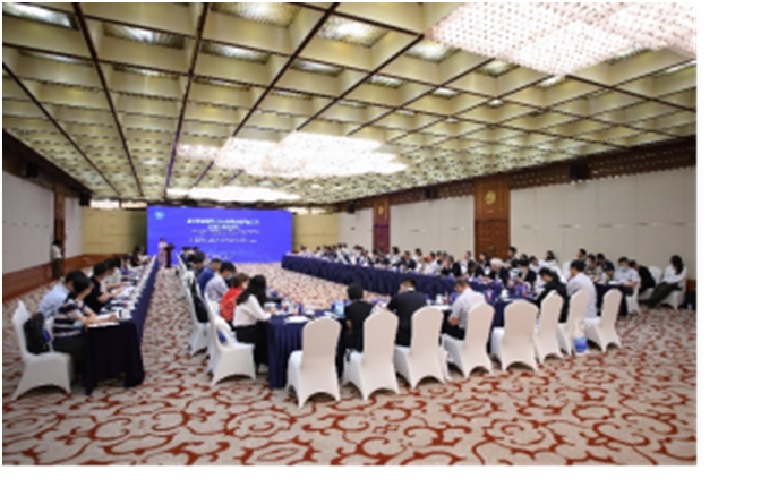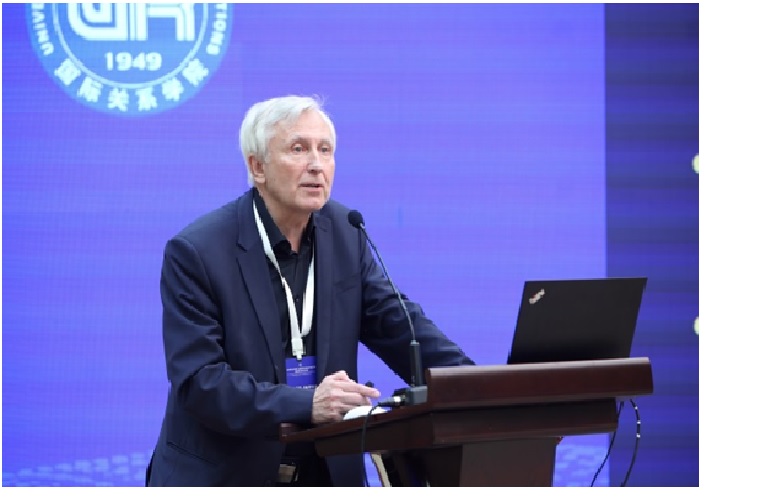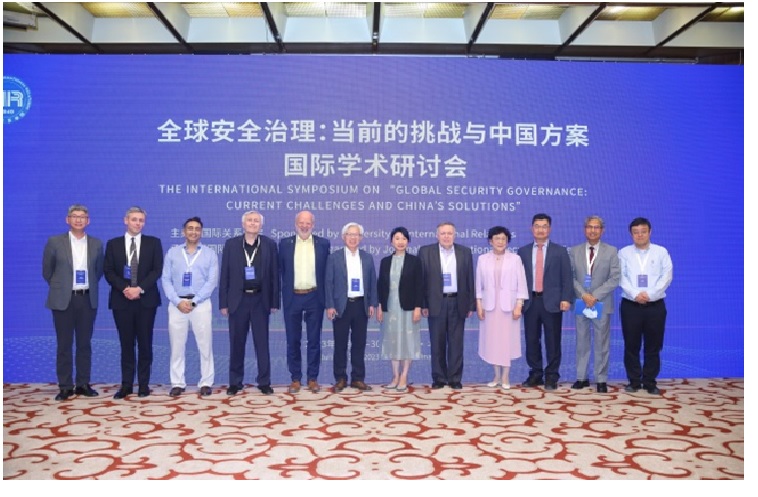Prof. Evgeny Pashentsev, a leading researcher at the Diplomatic Academy of the Ministry of Foreign Affairs of Russia presented June 29 2023 a paper at the international symposium on “Global Security Governance: Current Challenges and China’s Solutions” in Beijing.
Below we publish a summary of his paper there.




The global crisis is rapidly transforming everyday reality. There is a slowdown in the pace of social and economic development, such problems as hunger and poverty are growing not only in developing but also in developed countries. Property polarization is increasing. Social and political conflicts are escalating. International tensions have brought the world to the brink of World War III. In these conditions, the role of leading interstate associations is objectively great, whose position can become a factor of further uncontested and destructive destabilization of global governance, or vice versa, offering the world a way to overcome the crisis in the interests of not only this or that interstate association, but also of all mankind. Military-political aggressive blocs that have led the world to destructive wars more than once in history, including two world wars in the 20th century, or free associations of countries looking for an alternative to the imperfections of the present-day social and economic world order in progressive transformations, and not in unrestrained arms race fraught with nuclear Armageddon. The second type of interstate association can be with time BRICS, connecting the current fragile and very dangerous situation with a better future, not with a thin thread of hope, but with a significant potential of opportunities and real things at the global level BRICS association of five countries already accounts for 27% of the world’s land surface and 43% of the world’s population. By 2050, the overall volume of the BRICS economies (even without considering the possibility of expanding this association in the near future) will exceed that of the G7 economies. With the possible and rather soon amplification of BRICS by many other countries with big economic and natural resources this growth of the economic potential of BRICS successor can happen much earlier. The successful strategic communication of such an association depends not least on China and Russia, which make a decisive contribution to the activities of the association in many areas and whose potentials complement each other in many ways.
Without strategic deeds, there is only a set of long-term communication goals on principal issues; whether they are adequate or truthful—or not—depends. Without relevant state deeds, the communication is very often nothing than a vague of propaganda, perhaps even a strategic one. Sometimes, for example, synchronization of the wrong words, images and deeds has led to global disaster. Efficient deeds (first great and rather easy successes on the fronts of World War II, plus robbery of ‘Untermenschen’ all over Europe) made the majority of Germans firmly believe in the genius of Hitler (with the help of very efficient Nazi propaganda). We know the result well: more than 50 million victims of German aggression. Effective synchronization of deeds, words and images almost led to the world domination of fascism. Thus, strategic communication has not only to be an efficient synchronization of deeds, words and images but has an ethical and social dimension too.
In a failed state you can find no state strategy and no state strategic communication. But there is no vacuum in the current world. Instead of national strategic communication, there always appears strategic communication of other states or/and non-state transnational groups, such as in current Libya, for example. Through a rise of progressive social forces coming to power, strategic communication may appear once again, or the state will be split forever like the USSR—or taken over by reactionary forces with their own interests and agenda setting and relevant strategic communication. In failed states like Libya, such dilemmas are more or less evident. In still viable, more developed countries—yet in the group experiencing protracted crises—such processes are more difficult to detect. They are, however, no less real.
Firstly, strategic communication is not only communication by itself but also communication through state deeds.
Secondly, it is incorrect to consider strategic communication primarily a military tool; it is a strategic public administration tool (with a military dimension as well, of course).
Thirdly, it is necessary to confront not only a wrong strategic communication by itself, but also a state-run machine—if it supports itself by utilizing a wrong means of development.
Fourthly, the progressive forces can’t underestimate the role of efficient strategic communication as a tool for progressive changes. A progressive strategy without efficient means, based on advanced technologies, is objectively doomed to death.
Strategic communication on the global level is challenged now by the following objective factors:
– the rising poverty and social polarization in the world;
– the rising populism in politics in many countries ;
– the rising clashes between different ruling elite factions on strategic choices;
– the rising tensions between the leading powers;
– the crisis in social sciences and the evident crisis of the current educational systems in many countries;
– the decline of strategic analytics in the process of state decision-making in the leading countries;
– the rising challenges coming from new technologies despite all their advantages etc.
As a result, occurs a rising gap between deeds, words and images in state policies in many countries. Under the current situation improving the effectiveness of strategic communication of China and Russia, among other things, requires further efforts in the following areas:
– synchronization of deeds, words and images of the state policy of each of the two countries should take into account the peculiarities of their national interests and objective opportunities;
– the development of the information and communication sphere and the improvement of feedback mechanisms of state bodies and society (without this there is no strategic communication of the democratic state);
– optimization of relations between the state bodies themselves (otherwise, the mechanism of the strategic communication inevitably suffers, up to its degeneration into the communication of some state-corporate clans under the banner of the state strategic communication);
– optimization of relations between the strategic communication of BRICS members (without which there is no BRICS strategic communication).
Both China and Russia to make their strategic communication in the global arena more efficient should:
– launch joint projects in the domains which are crucial for the increase of prosperity and liquidation of current inequality misbalances in BRICS and outside BRICS;
– pay a priority interest in bi- and multilateral relations within BRICS to hi-tech projects wherever and as much as it is considered mutually beneficial;
– follow by maximal possible transparency on the preparation and implementation of joint projects;
– discuss the idea of creation of a BRICS communication network (based on intelligent text recognition) in the future;
– jointly resist attempts of neocolonial pressure, sanctions and military threats;
– organize a system of counteraction to HT psychological campaigns against BRICS;
The success of a road to a better future of Earth greatly depends on how successful both China and Russia will be in their messaging through practical deeds within BRICS and outside BRICS (both in the South and North)in search of more advanced dynamic equilibrium-based not a redistribution of global assets among elite groups but more efficient, HT socially-oriented global order in the interests of all mankind. The road to a better future will be extremely difficult and dangerous but there is no alternative to this path except global war and the destruction of humanity.



 0
0 1766 Views
1766 Views 12 July 2023
12 July 2023 Evgeny PASHENTSEV, leading researcher at the Diplomatic Academy, Moscow
Evgeny PASHENTSEV, leading researcher at the Diplomatic Academy, Moscow